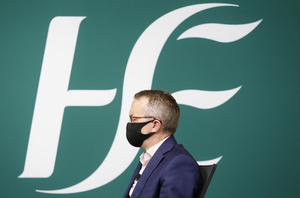
Professor Ronan Collins
This morning.
RTÉ Radio One’s Today with Claire Byrne.
Professor Ronan Collins, a consultant geriatrician at Tallaght Hospital in Dublin, spoke to Claire Byrne.
The host began by asking Prof Collins if he believed pubs which don’t serve food should be allowed to reopen.
They then spoke about recent news reports that 70 people aged over 75 have tested positive for Covid-19 over the past fortnight.
Prof. Ronan Collins: “It’s not about pubs and drink as such, it’s actually about the pubs opening, the pubs are part of our normal life and that I suppose I would agree with the Tànaiste to a degree that we do have to get back to living and that includes normalising life in as far as possible.”
Claire Byrne: “That’s across the board and not just pubs then?”
Collins: “Absolutely, because, you know, to be fair, listen, again I think it can be easy to dichotomise showing scenes from, like Killarney last week or maybe scenes from Temple Bar. But there’s a different reality to this as well. First of all, I agree with you. The current situation is a little bit of a farce from what I’ve observed in terms of people serving food and what is going on.
“But if you go down to many places now in the small villages, small towns and indeed I have family who have lived in these areas themselves, all they have as their community centre, and it’s not even about drink, it’s about where people meet, have a chance to exchange some news, you know, support one another. And we’re faced into winter and I think, we do have to learn how to live with this virus.
“The one thing I would make, just as a personal comment, you know, I think all of our views have matured as the situation has progressed but the one thing I’ve learned myself is that we have lost, as a society, the skills of how to live with a pandemic. I heard our Taoiseach last night saying “unprecedented”. It’s hardly “unprecedented” that we have a pandemic. We had four of them in the 1900s and ironically, in the last 20 years, we’ve had four or five threatened or actual pandemics. This was always coming and we have lost our skillset as a society of how to live and cope through a pandemic.”
Byrne: “Well, look, I know people will be worried today because of that news that there have been 70 cases in the over-75s age group and I want to ask you about that next…”
Collins: “Claire, are these cases or are they positive swab results? Because most of us in the hospitals are not seeing this big surge of cases. Now the truth is, and I’m not, I don’t want, in any way, to be compared with some, kind of, more radical commentators on this but if you do swab more people, you will find more cases, inverted commas, of people who have shown positivity on a swab. These people may not even be ill. Some of them are very mildly and are very self-limiting illnesses and I think there’s a degree of, kind of…”
“I think it would be helpful actually, if these bulletins are going to continue every night and I’m not sure about the wisdom of that going forward either. It is important to keep public aware…but I’m not sure having a day-by-day count every day is helping necessarily either at the moment.
“I mean I think hospitalisations are a good marker of actually…”
Byrne: “I mean they’re down. We know they are down.”
Collins: “Yes, so, I mean, you don’t want to be terrorising people either. There is a real danger here, you know, that the greater good of society will not be served by continuing to adopt the ultra-conservative approach. Death rate is a very important outcome of this pandemic. But it is not the only outcome of when we come through this pandemic and how society looks like afterward.”
Byrne: “So you seem to be saying that older people need not to be afraid by this news?”
Collins: “Well, listen everybody needs to be afraid. Because it’s a serious infection and it is a more serious infection as you get older. Although age, in itself, and I keep on making this point, age, in itself, is not the greatest risk factor for determining how seriously unwell you become with this. It is a big factor but it’s underlying illnesses, is actually a major determinant of mortality and things like that.
“So I mean we all need to be afraid. Listen, there’s people of my age who died from this and you became quite unwell yourself, I believe, with the virus. I’m working with a doctor here at the moment who lost her father recently who is not that much older than me so I’m not trivialising this at all. This is a serious infection but we do also have to understand that there is a society at whole that needs to move on.
“We have to learn how to live with this virus. There is not a vaccine next month, there is not a vaccine in two or three months. There may be a vaccine in a year, we don’t know yet. We are going to have to learn how to live with a pandemic and, you know what, it’s a little bit of a wake-up call, to us. Many people in Africa have to live with the threat of serious infection and we forgot, I think, since the time of maybe the TB outbreaks and the Polio outbreaks in Cork and serious outbreaks of Rheumatic Fever, etc, all very serious illnesses but we have forgotten, as a society, of how to cope and live with the threat of infection.”
Earlier: Soz
Pic: YouTube








